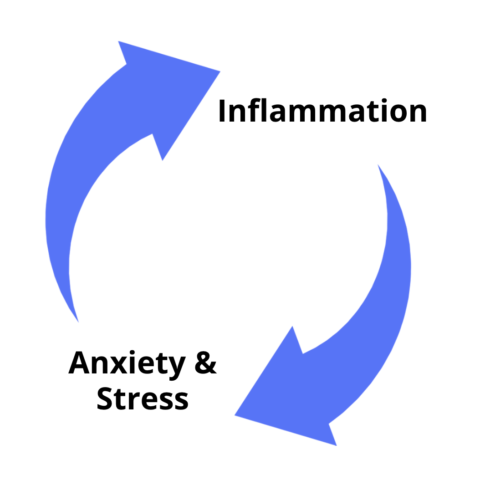
Did you know that stress and anxiety can magnify existing inflammation 10x over (or more!), making what starts out as a small problem turn into something that can wreak havoc in your life? Anxiety-amplified inflammation can lead to issues like brain fog, fatigue, gut issues, poor attention, mood swings, coughing, sneezing and more.
I discovered this after working with a lot of clients who had sensitivities to toxins like mold, chemicals or gluten.
After seeing that removing the toxin often didn’t immediately solve my client’s issues, I did a lot of research and realized it was because anxiety was lurking in the background as a hidden toxin, sending them through a cycle of destructive inflammation.
How To Deal With Toxic Anxiety
Toxins are everywhere in the world. We are exposed to them every day in our diet and environment.
However, toxins become a problem when our immune system doesn’t recognize and get rid of them. They stick around in our body and start to cause inflammation. The inflammation can spread throughout our body, from our gut to our brain. That’s when the symptoms start.
For many, the small amount of inflammation from the toxin wouldn’t be a problem, or even noticeable. But for many, who struggle with stress and anxiety, the inflammation quickly compounds.
Prolonged stress leads to increased levels of cortisol. Then, cortisol can’t do its job and regulate both the inflammatory and immune response because it decreases tissue sensitivity to cortisol.
Perhaps the most interesting thing I found when working with my clients is that the ones most affected by toxins had specific genetic variants that also increased their susceptibility to anxiety.
One gene that often came up was the HTR2A gene. HTR2A encodes a serotonin receptor – the “happiness hormone.” But the negative variant encodes too many receptors, which influences the release of the stress hormone cortisol.
As I mentioned above, increased cortisol = increased anxiety.
Interesting enough, this receptor is the same receptor that is acted on by psychedelics.
Many people report significant long term alterations in their physical health problems after psychedelics, which probably has to do with this receptor.
Decrease Anxiety & Improve Toxin Response
If you really want to address toxin issues, there’s two extremely important steps. First, you’ll have to address the original toxin source.
Second, and almost more importantly, you need to address your anxiety levels.
Of course, it’s not as easy as saying “stress less”.
Actually, telling someone to stress less can make them even more stressed – because now they are stressing out about stressing out, and the cycle goes on.
The real solution is to rewire the way your body handles stress.
You can do that by looking at your genes and implementing targeted changes that will actually change your genetic expression and function.
That’s why we created the Anxiety DNA Wellness Report.
It looks at 28 different genes related to anxiety and provides you with a personalized and prioritized list of diet, supplement and lifestyle changes based on your own unique variants.
You’ll know exactly what changes are most important so that you can feel less stressed, reduce inflammation and improve your overall health and well-being.
Getting your own report is easy!
Just head over to SelfDecode, order a DNA kit when you sign up (or just upload an existing DNA file you already have) and download your Anxiety DNA Report!
I also suggest downloading the Mood, Attention, Cognitive and Inflammation reports if you have toxin sensitivity issues.

